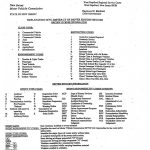Unlocking The Wonders: Exploring The Abstract In A Science Fair Project
Abstract in a Science Fair Project
Introduction
Greetings, Smart Readers! In today’s article, we will explore the importance of abstracts in a science fair project. As you may know, a science fair project is an opportunity for students to showcase their scientific knowledge and skills. It involves conducting experiments, analyzing data, and presenting findings to a wider audience. The abstract, in particular, plays a vital role in summarizing the project and capturing the attention of judges, peers, and visitors. Let’s delve deeper into the significance of abstracts and how to make them effective.
An abstract is a concise summary of a project that provides an overview of its purpose, methods, results, and conclusions. It is often the first section of a science fair project that judges and visitors read, making it crucial for creating a positive first impression. An impactful abstract should accurately reflect the project’s objectives, findings, and significance, while also being engaging and informative. It serves as a teaser, enticing the reader to explore the project further.
1 Picture Gallery: Unlocking The Wonders: Exploring The Abstract In A Science Fair Project

Now, let’s take a closer look at the key components of an abstract in a science fair project:
What is an Abstract in a Science Fair Project? 🧪
The abstract in a science fair project is a concise summary that provides an overview of the project’s purpose, methods, results, and conclusions. It is typically limited to a specific word count and is meant to capture the essence of the project. Think of it as a miniaturized version of the entire project, highlighting its key aspects and findings.
Why is an Abstract Important? 🌟

Image Source: slideplayer.com
An abstract is important for several reasons:
First Impressions: The abstract is usually the first thing judges and visitors read. It sets the tone for the project and influences their perception.
Summarizes the Project: The abstract provides a succinct summary of the project, allowing readers to quickly grasp its purpose and findings.
Filters the Audience: Visitors can decide whether they want to delve deeper into the project based on the abstract. It helps attract the right audience.
Guides Judges’ Evaluation: Judges often refer to the abstract when scoring a project. A well-written abstract can positively impact the project’s evaluation.
Now that we understand the importance of abstracts, let’s explore how to create an effective one:
How to Write an Effective Abstract? ✍️
Writing an effective abstract requires careful consideration of the project’s key aspects. Here are some guidelines to help you create an impactful abstract:
Keep it concise: Stick to the specified word count and provide only essential information.
Use clear and concise language: Avoid jargon and technical terms that may confuse readers.
Include the project’s purpose: Clearly state the objective or question the project aims to address.
Describe the methods: Briefly explain the experimental procedures or research methods used.
Present the results: Summarize the key findings and highlight any significant observations or trends.
State the conclusions: Provide a concise summary of the project’s conclusions and their implications.
Proofread and revise: Ensure that the abstract is well-written, error-free, and effectively communicates the project’s essence.
Advantages and Disadvantages of Abstracts in Science Fair Projects 📚
Let’s now discuss the advantages and disadvantages of including abstracts in science fair projects:
Advantages of Abstracts:
Attracting Attention: An abstract serves as a hook to capture the interest of judges and visitors.
Providing a Summary: It offers a concise overview of the project, saving time for busy readers.
Highlighting Key Points: Abstracts identify the most important aspects and findings of the project.
Evaluating Relevance: Readers can quickly determine if the project aligns with their interests or research.
Enhancing Presentation Skills: Crafting an abstract helps students practice summarizing and communicating their work effectively.
Disadvantages of Abstracts:
Omitting Details: Due to their concise nature, abstracts may not capture all the nuances and intricacies of the project.
Difficulty in Summarizing: Condensing a complex project into a brief abstract can be challenging for some students.
Potential Misrepresentation: If not carefully written, an abstract may misrepresent the project’s findings or scope.
Frequently Asked Questions (FAQs) about Abstracts in Science Fair Projects ❓
1. Q: What is the ideal length of an abstract in a science fair project?
A: The ideal length of an abstract varies but is typically limited to a specific word count, such as 250-300 words.
2. Q: Should I include references in my abstract?
A: Generally, abstracts do not include references. However, it’s essential to follow any specific guidelines provided by your science fair or teacher.
3. Q: Can I include visuals in my abstract?
A: Abstracts usually do not include visuals. They focus on summarizing the project’s key aspects through concise text.
4. Q: Should I write the abstract before or after completing the project?
A: It’s generally recommended to write the abstract after completing the project. This way, you can accurately summarize the entire project.
5. Q: Can I use bullet points in my abstract?
A: Bullet points are not commonly used in abstracts. It is best to use clear and concise sentences to summarize the project’s key aspects.
Conclusion
In conclusion, abstracts play a crucial role in science fair projects. They serve as concise summaries that capture the attention of judges and visitors, providing an overview of the project’s purpose, methods, results, and conclusions. By crafting an effective abstract, students can enhance their project’s appeal, engage the audience, and improve their chances of success. So, remember to invest time and effort into creating a compelling abstract that accurately represents your project’s essence. Best of luck with your science fair endeavors!
Final Remarks
Thank you, Smart Readers, for joining us on this journey into the world of abstracts in science fair projects. We hope this article has provided valuable insights and guidance for creating impactful abstracts. Remember to always check the specific guidelines provided by your science fair or teacher when writing an abstract. Good luck with your projects, and may your abstracts captivate the minds of judges and visitors alike!
This post topic: Abstract



